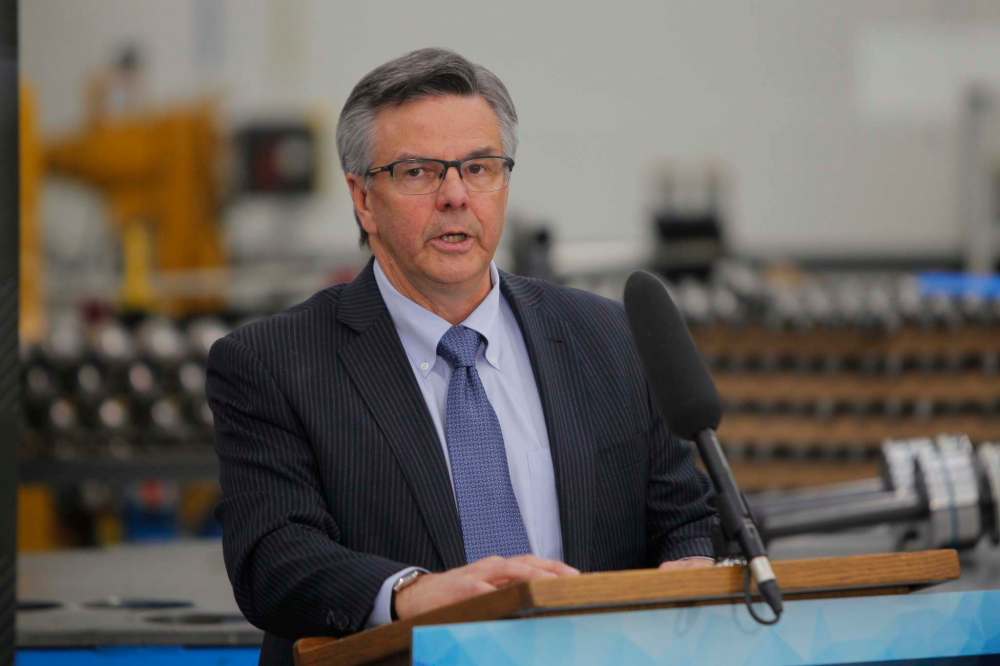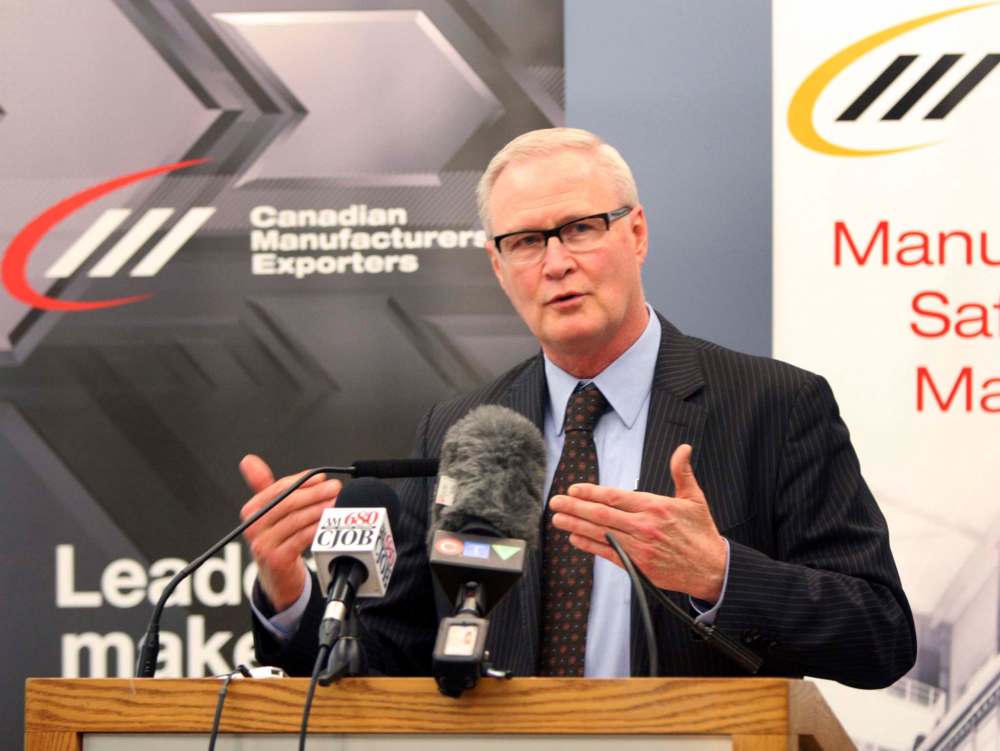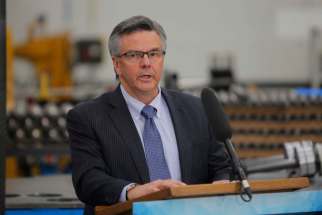Manitoba manufacturers face coronavirus uncertainty
Read this article for free:
or
Already have an account? Log in here »
To continue reading, please subscribe:
Monthly Digital Subscription
$0 for the first 4 weeks*
- Enjoy unlimited reading on winnipegfreepress.com
- Read the E-Edition, our digital replica newspaper
- Access News Break, our award-winning app
- Play interactive puzzles
*No charge for 4 weeks then price increases to the regular rate of $19.00 plus GST every four weeks. Offer available to new and qualified returning subscribers only. Cancel any time.
Monthly Digital Subscription
$4.75/week*
- Enjoy unlimited reading on winnipegfreepress.com
- Read the E-Edition, our digital replica newspaper
- Access News Break, our award-winning app
- Play interactive puzzles
*Billed as $19 plus GST every four weeks. Cancel any time.
To continue reading, please subscribe:
Add Free Press access to your Brandon Sun subscription for only an additional
$1 for the first 4 weeks*
*Your next subscription payment will increase by $1.00 and you will be charged $16.99 plus GST for four weeks. After four weeks, your payment will increase to $23.99 plus GST every four weeks.
Read unlimited articles for free today:
or
Already have an account? Log in here »
Hey there, time traveller!
This article was published 04/03/2020 (2105 days ago), so information in it may no longer be current.
Concerns about potential layoffs and production disruptions are growing among Manitoba manufacturers as international trade fell by $47 billion last month and trade and travel restrictions mount as countries around the world try to contain the spread of the coronavirus.
On Wednesday, the Bank of Canada lowered interest rates by 50 basis points following the lead of the U.S Federal Reserve which took the same action on Tuesday. The Bank of Canada said that while the Canadian economy has been operating close to potential, “the COVID-19 virus is a material negative shock to the Canadian and global outlooks, and monetary and fiscal authorities are responding.”
That shock is being felt across the board.

Roy Cook, the CEO of Monarch Industries said, “I think everyone is still trying to get their head wrapped around what is going to happen when it is going to happen and how severe it is going to be.”
Monarch Industries, a Winnipeg manufacturer of hydraulics equipment with about 500 employees has a 40-person joint venture in China that is now back to a desired rate of production as is other of Monarch’s Chinese component suppliers.
He said his company is not seeking alternative supply chain strategies. “As a contingency, we have some capability internally that we can employ if we need to,” he said.
An official from New Flyer said it has received notification of potential supply delays and possible shortages of components if the disruption continues or escalates.
“NFI (New Flyer Industries) will continually assess, is actively investigating supply alternatives, developing appropriate mitigation plans and keeping our teams informed,” the spokeswoman said.
For many companies like Monarch Industries, the COVID-19 disruption is just another challenge to have to deal with after the recent rail blockade that was preceded by a rail strike.

Ron Koslowsky, the vice-president of Canadian Manufactures and Exporter said his members were hard done by with the rail disruption and now the global supply uncertainty is adding that much more stress.
“In a recent discussion with my board almost every one said they are being affected,” Koslowsky said. “They are concerned because their inventories are getting low as they wait for parts. Already some of them were spending more shipping their goods by truck when the rail blockade was occurring.”
Chris Bachinski, president of Winnipeg-based GHY International custom brokers, said companies are running out of inventory and some are now considering using air freight, a much more expensive option, as well as spending lots of time and effort trying to come up with alternative supply chain strategies.
“The ripple effect has yet to hit us,” Bachinski said. “People are working on inventories from 30 days ago. Now the shipments that should be at the port have not even left the country of origin. Even some retailers are running short and we may start seeing some empty shelves.”
The pall of uncertainty over international trade dynamics for existing exporters is also putting a crimp in the plans of companies who had been planning to expand their business to international markets.
Mariette Mulaire, president of World Trade Centre Winnipeg, said trade shows around the world are being cancelled, including the World Trade Centre’s own 50th anniversary annual convention that was scheduled for this month in Taipei, Taiwan.

“Companies count on trade shows as the foundation as they start talking about trade with other countries,” she said.
Mulaire said the current disruption in trade flows might be a good time for companies to think more seriously about devising alternative supply chain strategies for the future.
McKinsey & Company, in a report that came out this week, said the expectation is that global economic growth will slow in 2020 by 0.3 to 0.7 per cent. It presents a few scenarios about when international travel and trade will get back to normal, from the least likely — economic impact mostly restricted to the first quarter of the year — to the most pessimistic where consumer confidence remains low into the fourth quarter and air travel restrictions remain in place until the end of the year.
The most likely is that travel returns to normal in the third quarter.
Meanwhile, as Monarch Industries’ Cook said, “We anticipate some disruptions but we are working very hard to manage through them with minimal impact on customers and our employees.”
There have been no confirmed reports among manufacturers of any material layoffs but clearly there is plenty of uncertainty.

“I don’t want to be alarmist,” Cook said. “It is challenging but I don’t want to blow it out of proportion. So far it’s not bad.”
martin.cash@freepress.mb.ca

Martin Cash has been writing a column and business news at the Free Press since 1989. Over those years he’s written through a number of business cycles and the rise and fall (and rise) in fortunes of many local businesses.
Our newsroom depends on a growing audience of readers to power our journalism. If you are not a paid reader, please consider becoming a subscriber.
Our newsroom depends on its audience of readers to power our journalism. Thank you for your support.
History
Updated on Thursday, March 5, 2020 11:02 AM CST: Corrects typo in headline













